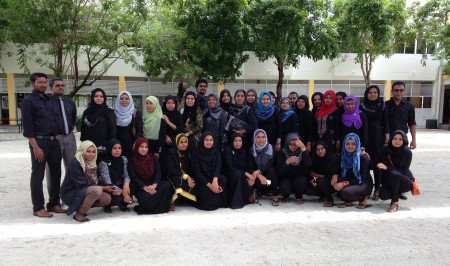‘We don’t need a female Maldivian DJ,’ Angie recalls her first rejection from a local DJ agency.
“They didn’t even check how I played, if I was good or bad, nothing. Just the fact that I’m a female and Maldivian they could decide that they don’t want me.”
While the music scene in the Maldives is growing, for a young DJ wishing to enter the DJ circuit, the venues to play are still few and far between. Throw into the equation that you are the first female Maldivian DJ ever to formally graduate, and there are an entirely new set of hurdles to cross if you are to make your name.
“In 2008, I decided that this was what I wanted to do.” says 26 year-old Aminath Fazleena Abbas, also known as Angie. “Even when I did the course I didn’t realise that I was the only girl, I didn’t think that was possible.”
Angie is originally from Malé, the capital of the Maldives. After travelling abroad to study Electronic Music Production in Thailand, it wasn’t until her return that she realised she was the first woman in the Maldives to do so, she explained.
“I think it’s sad, ” she said. “I’m sure there are plenty of girls that have an interest, but due to the cultural and religious side of Maldives they are unable to do it.”
With no formal clubs in the capital, DJs often get work by playing on nearby islands – either on tourist resorts or at private parties. However, competition for these DJ slots are high – with a few agencies monopolising many of the contracts.
“When I first started in 2013 I didn’t have any contacts – no-one – so I just called resorts from the Visit Maldives group. Most of the answers were that ‘we didn’t need DJs in this resort because they had contracts with different organisations.’ ”
One such reply was particularly blunt: “They sent me a reply after a few weeks, ‘we don’t need a female Maldivian DJ’,” recalled Angie.
“That really demotivated me, since they were the main people. They didn’t even check how I played, if I was good or bad, nothing, just the fact that I’m a female and Maldivian they could decide that they don’t want me.”
“Once we join these organisations, more than 50 percent of what the resort pays go to the organisation, and the DJ gets payed 50 percent or less. So they really don’t like it when someone is around and they are doing it on their own – they want their people to go so they will get the money.”
After some time calling around and working hard, she landed a contract with a local agency and began playing gigs at a nearby resort. However, not everything has been easy since forming the new partnership.
“Normally the resort staff are really nice, it’s just the organisers – people who are fighting for the money. They want to know – is this oriented for them?”
“The pay differs, mostly US$200/300 per night, but when you come to 3-star it will be like US$100. I have once gone to a resort, and I got payed US$75. But since I was new – since I didn’t have experience – I didn’t know any better. I took the money, I just wanted the experience.”

Not only was there an issue with the pay, Angie continued, but also the music had to be compromised in order to land gigs with certain resorts.
“I like to play deep house, minimal, trance, techno, dub,” Angie explains, “But you can’t do it here in the Maldives, because you can’t get places to play.”
“When I did the New Year 2013 gig, I mixed up music that I preferred into it, and it didn’t turn out well. Most of the resorts don’t want that. Because for those who don’t like this kind of music they don’t want to hear it – they want to hear the old – really old – retro kind of music.”
“That was the first time I realised, ‘okay, I have to change to play what they want me to play’. So I did that at first – but now I don’t want to do that anymore, because I can find – though very few – resorts where I can play deep house and I can keep to the range of genres that I like.”
The opportunity for local DJs to play music they are passionate about often comes at parties organised on private islands.
“There are private islands, there I can play deep house, tech house, minimal. They are not looking for people to come and dance, they want good music in the bar at night, so I love that place because I can play the kind of music I want to play.”
Local festivals also provide a place for Angie to play her preferred genres of deep house and minimal. O.T.U.M, Angie explains, is a two-day festival set up by a collective of local DJs and artists called The Underground Movement.
According to the Underground Movement’s statement, “It is important to appreciate that the motive behind such a series of gatherings goes beyond mere merry-making and the fulfillment of a badly neglected need for entertainment.”
Set on a nearby local island, this two-stage festival gives local acts the chance to play to a crowd just for the love of music, without seeking a huge profit.
Angie will be playing at the pioneering festival alongside an eclectic line-up of DJs, with some travelling from Sri Lanka and India, and representing the cutting edge Maldivian dance music scene.
“Let’s say it [the music scene] is getting better, slowly,” says Angie. “Slowly, but it’s happening now.”
Likes (2)Dislikes
(2)Dislikes (0)
(0) 
